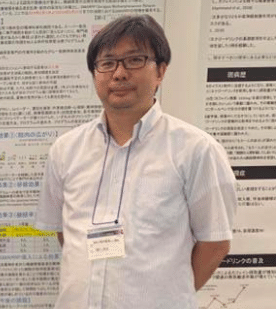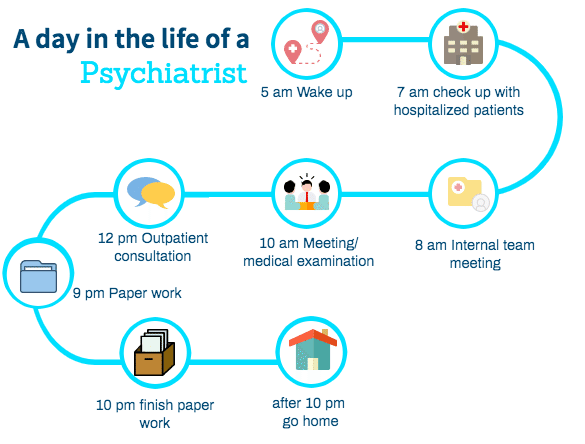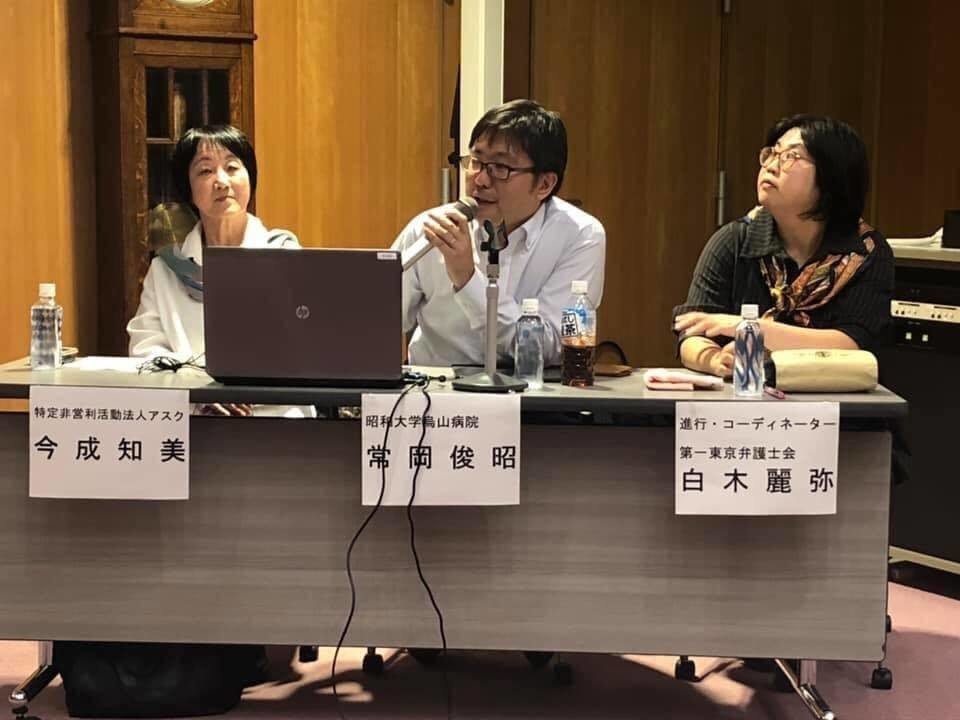
the Mind & the Heart - interviewing Dr Tsuneoka, a Psychiatrist!
(Interviewed August 2020)
Dr Tsuneoka's Profile
Dr Toshiaki Tsuneoka, who is in charge of the psychiatric department of Showa University Karasuyama Hospital!

Born in Kanagawa prefecture in 1979.
After graduating from Showa University School of Medicine in 2004, he entered the Department of Psychiatry at Showa University School of Medicine. He has been working at Showa University Karasuyama Hospital since 2009.
Since 2010, he has been an assistant professor in the same course.
In 2015, he travelled around Eastern Europe, South America and Asia as a backpacker. After that, he worked as a lecturer in the same course, a subacute ward director① , and a super emergency ward director② and since 2018 he has been a chronic ward director③ and continues to this day. His specialty is drug addiction, gambling addiction, alcohol addiction, etc. He has also written a book called "僕らのアディクション治療法"(Japanese). Please read it.
① Subacute Ward: a hospital ward for patients who are preparing to go home.
② Super Emergency Ward: a hospital ward for emergencies and patients that need concentrated treatment.
③ Chronic Ward: a hospital ward for patients with stable condition.
What is a Psychiatrist?
Psychiatrists (sai-kai-uh-truhsts) are doctors who are experts in the field of mental health. (Called "psychiatry".) They are involved in the treatment and prevention of mental illnesses and the maintenance of people's mental health.
In the department of psychiatry, many different occupations exist and they cooperate to provide the best treatment.
What kind of people do you work with at the Department of Psychiatry?
There are six main occupations in the department of psychiatry: the doctor, the nurse, the pharmacist, the social worker, the occupational therapist and the psychologist.
The nurse is the closest to the doctor. They tell us what they learned about the patients and their families. The pharmacist is the medical specialist who helps doctors and patients to complete their medical treatment successfully. Social workers are familiar with the regions' support system for patients and their families and provide solutions to certain problems. Occupational therapists give the patient a role. By doing work, the patient finds a purpose and it helps heal them. The psychologist supports the patient from an emotional angle.
As leaders, psychiatrists balance team members to help their patients with their respective specialities and intervene when the manpower of each occupation is insufficient. Finally, if something happens, I take responsibility and bow (laughs).
The everyday life of a psychiatrist
The most common part of the day is the medical examination. I listen to people most often.

What is the difference between psychiatry departments and psychosomatic departments?
Psychosomatic medicine is just a part of internal medicine. They treat stress-related problems that have symptoms that appear physically, such as having stomachaches due to stress and not being able to eat. But there are some overlaps. Depression may cause headaches, loss of appetite, and abdominal pain.
Also, there is a qualification called "Seishin Hoken Shitei Doctor (Designated Mental Health Doctor)", which can be obtained by a psychiatrist. Psychiatric doctors can force critically ill patients to be hospitalized. (e.g. patients who attempted to commit suicide or patients who are violent and are causing harm to others.) Physicians of Internal medicine do not have this authority.
Currently, there is an idea that it is normal to see a physician in the department of psychosomatic medicine, but the department of psychiatry is for crazy people. In certain cases, this may deter patients from seeking the right treatment and so newly opened doctors may name their department both "psychiatry and psychosomatic medicine". This is probably part of the confusion.
It was a little refreshing to understand the difference between psychosomatic medicine and psychiatry. In the future, if I have a mental trouble, I will visit a psychiatrist, regardless of the image.
Can psychiatrists join DMATs?
Most psychiatrists belong to the DPAT (Disaster Palliative Assistance Team). You can think of it as a psychiatric version of DMAT (Disaster Medical Assistance Team). I don't know if there are psychiatrists in DMATs.
On notable examples, DPAT was dispatched to respond to the Great East Japan Earthquake and, more recently, the new Coronavirus cases aboard the cruise ship, Diamond Princess. We listen to people's anxieties in the event of a disaster and provide mental support.
DPAT homepage: https://www.dpat.jp/ (Right click→Select "Translate English")
Dr Tsuneoka's childhood
Elementary school
When I think about it now, I don't really think I was a great person. And I wasn't cooperative. Thinking in others' shoes didn't come to my mind, and I was repeated the cycle of bullied or being a bully. But I liked studying. It was a pleasure to solve a problem, and I used to compete with my friends to see who could solve the fastest. I liked Dragon Quest.
Junior high school
I went to a junior and senior high school for boys. It was my daily routine to go to school, then go home as soon as possible to play Dragon Quest. I poured all my energy into conquering Dragon Quest.
High school
I applied to be an event staff member for a high school students' music event at Yokohama Stadium; there I saw a high school student smoking for the first time (I never thought those sort of people existed other than in mangas!). I learned that there are many kinds people in the world.
I decided to be a psychiatrist in high school.
A female friend in high school was doing self-harm. Nowadays, when you hear "self-harm", you can easily understand what it means. But at that time, the concept of "self-harm" wasn't as widespread as it is now, and when I first saw it, I wondered "She's bleeding, it looks really painful, why is she doing it?" Then she said, "I dunno. It's refreshing to see blood."
That event made me interested in psychology and counseling. A different friend's mother was a counsellor, so I asked her how I could become a counsellor. She told me that "The psychiatrist is the leader. If the leader is stupid, the power of team medical care can't be demonstrated. I'm a counsellor and I struggle with this hierarchy. You must become a psychiatrist first." So I became a psychiatrist. I also considered becoming a lawyer, but I thought that being a psychiatrist would be better, so I decided to go on to medical school.
Chose Showa University from a senpai's advice
At that time, Showa University's tuition fees were the cheapest in my options. So I applied to Showa University and Keio University. When I was in high school, I seriously thought that I could go to Keio University for no reason, so I was very shocked when I failed the entrance exam for Keio University and passed the one for Showa University.
I wanted to join Keio University School of Medicine, so I thought I should be a 'ronin' (a Japanese word for people who were rejected by universities), but after receiving advice from a person who had been a 'ronin' for four years, (and my parents told me that they would pay the tuition fees), I went to Showa University (without becoming a 'ronin').
I was a backpacker(ish) [2015]
I've always liked travelling and have been abroad since I was a student. When I was in university, I went to Greece as an exchange student. There, I met a backpacker and I admired him a lot. When I was 33-34 years old, I enjoyed my work and I didn't care about travelling, but I thought "I regret not being a backpacker now; I won't have the physical strength do it later in life." It's hard to walk with a heavy backpack on my back, so I pulled my suitcase along and became a "roller packer" (laughs).
Current challenges ~Change the world~
Recently, the number of patients who are gambling addicts is increasing. A common addiction mistake is that people don't consider it as an illness. Some people are refused treatment in hospitals after being told: "The fact that you're addicted is because you have a weak will. Besides, you can't get addicted unless you mess with it yourself."
My current challenge is to make the world aware of not only gambling addiction but also of problems such as kleptomania (an unexplained urge to shoplift). Putting someone in need of treatment in jail doesn't really solve the problem. I also published a book to let people know that mental illnesses are an illness that needs treatment and that it is curable.

Dr Tsuneoka speaking at an addiction awareness lecture
Know more about Addiction!
What we have learned at university is how to treat patients, not how to change society. Now, the people who are doing their best to change the world are those who have recovered from addiction. They are using their recovery experience to make an impact on society.
Others:
You can learn about addiction!
: What is addiction? (APA, USA)
: Addiction: what is it? (NHS, UK)
For those who are frustrated, want to hit eight, or have a hard time ... There is also a mental care site for young people.
Mental health and self-care for young people (NHS, UK)
The ups and downs of being a psychiatrist
I become very happy when patients who did not come to the hospital for a long time came. It's great when a patient who said "I'm never coming again!!" decides to come and see me. Sometimes I get reports that say "I'm glad I met this doctor" or "I became involved in society for the first time in ages!" and when I hear such reports and see the patients change to the better, I get a little teary.
On the other hand, I feel sad when the patient is trying to change, but the family and the community try to crush it, or when the patient suddenly commits suicide.
Common Psychiatrists stories ~the top 5~
・ Psychiatrists randomly analysing each other like a personality test. (Dr OO is kinda like "insert diagnosis name here"~right?)
・ In a psychiatrist's family, the female spouse is often stronger. (lol)There are little to no quarrels between partners.
・ There is (probably) less quarrel between doctors as well. (This is an individual impression compared to other clinical departments)
・ Sometimes I forget to keep track of time while listening to the patient's stories.
Do you like people?
I think psychiatry is suitable for people, who like people and don't have a hard time listening to stories they might not understand. Also, psychiatrists need to get along with people in different positions, and it is also important to be able to create relationships that allow them to discuss intimate things with completely different people. Because psychiatrists have to talk to people and find out what they need, communication skills are very important as well.
Aim for the School of Medicine!
The first step in becoming a psychiatrist in Japan is to graduate from the faculty of medicine and obtain a doctor's license. After that, I recommend that you practice in a place where there are many psychiatrists.
It is also a good idea to qualify as a "Seishin Hoken Shitei Doctor (Designated Mental Health Doctor)" (This is a qualification that only exists in Japan).
Psychiatrists are not limited to hospitals. You also have the option of becoming an industrial physician, basically a doctor at a company (a job that provides mental health care for company employees).
A "Senshin Hoken Hantei Doctor (doctor with the necessary academic experience as a mental health referee / expert)" goes to see the perpetrator of the case and decides if he/she has a mental illness or if he/she requires care. As you can see, psychiatrists also have many roles.
MOTTO
Everything has two sides. Any bad thing has a good side and vice versa. In modern times, making a mistake does not mean that you should commit seppuku (a method of suicide used by samurai, typically those who made serious mistakes.) Let's challenge various things!
Summary
Dr Tsuneoka said, "It is important to create a relationship where you can discuss with completely different people." "In modern times, making mistakes does not mean that you should commit seppuku. So let's try various things!" Those two comments hit me hard. As the doctor says, there are as many different ways of thinking in the world. Even if someone else thinks differently from myself, the person who can accept differences is a wonderful friend. I will continue to take on challenges!
If you want to contact Dr Tsuneoka
email: tsune1027[a]hotmail.com

Dr Tsuneoka's book (rough translation: Our addiction treatment methods)
(image courtesy of Amazon)
Book review
Using a process that was new at the time; the work seemed very fun because of the discoveries made by Dr Tsuneoka. But when it didn't work as planned, he still did his best. I will learn from that. I sometimes make promises with people, and then slip and forget. I will then try to do everything I can from that state rather than blaming myself and huddling. (I will also think about why that happened and how to avoid repeating it.)
ここから先は
¥ 500
この記事が気に入ったらサポートをしてみませんか?
